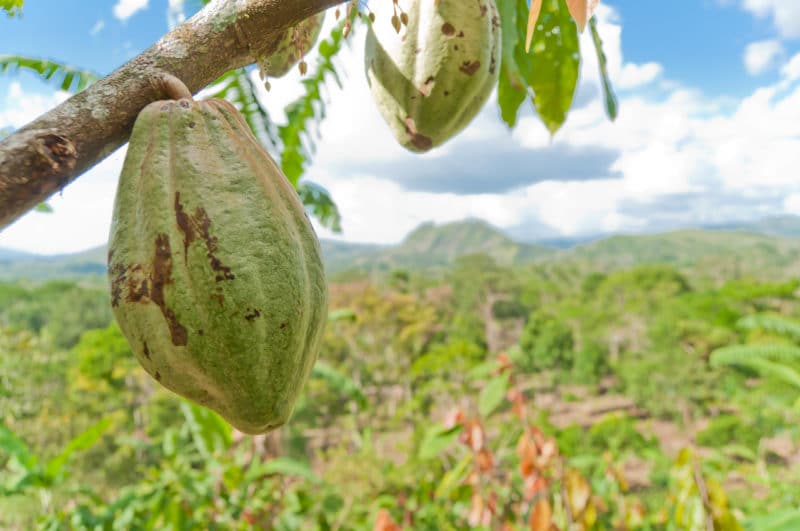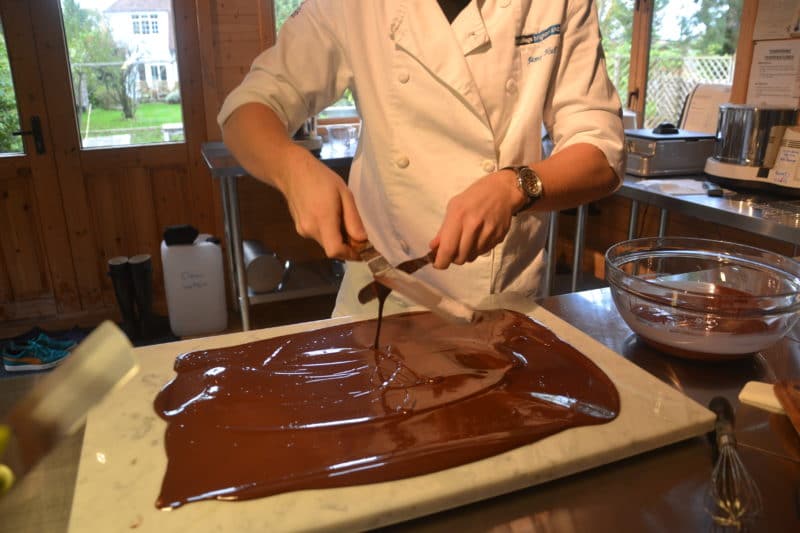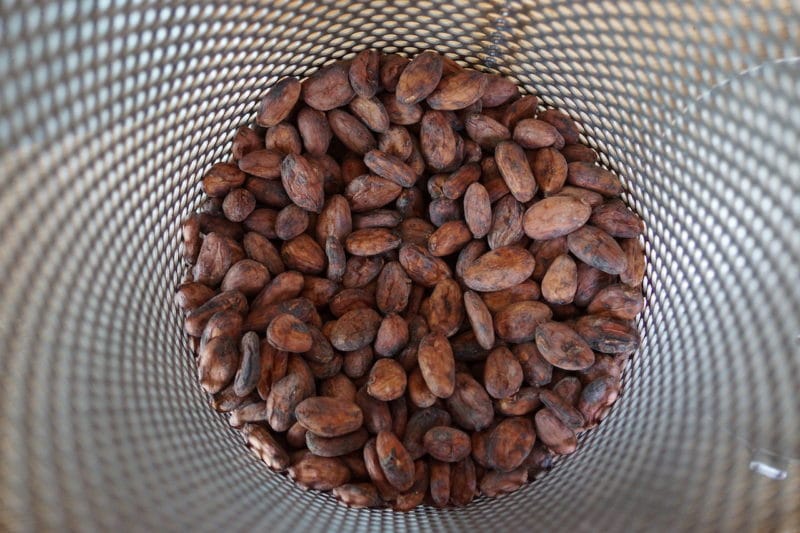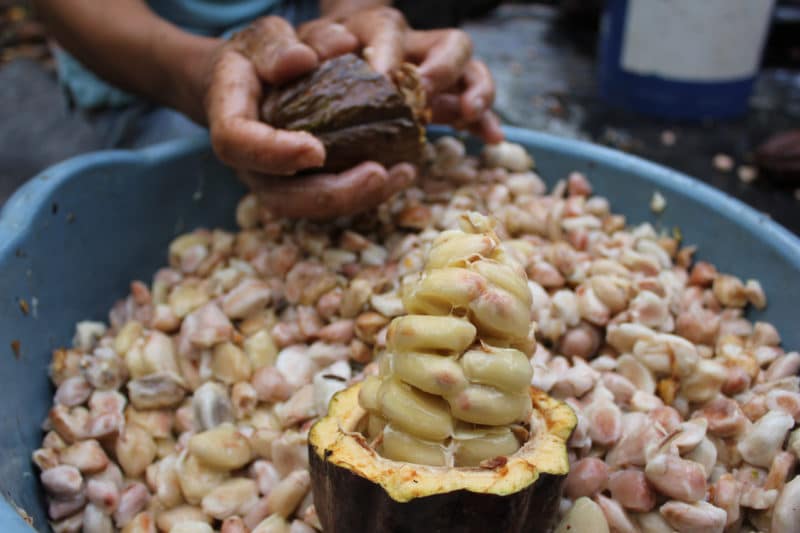Chocolatier James Hull talks to Jane Wolfe about how the award-winning Hassocks-based brand J.Cocoa grew out of his passion for the bean and desire to give cocoa farmers their fair dues
Can you tell me a bit about J.Cocoa and why you chose to produce bean to bar chocolate?
From simple curiosity to hobby to full-time business, my bean to bar making journey has been a whirlwind. I knew very little about where chocolate comes from and how it is created until I was at a ‘how to flavour chocolate’ demo. Someone asked the chef, ‘but how do you make your chocolate?’, to which she had to confess she just buys it all ready-made, then simply melts it down. This got me thinking, how many companies actually make their own chocolate, and if they don’t, why not? I was surprised to find in the UK that we only had a couple of actual chocolate makers.
 So with curiosity and information from old books and Google, I stupidly thought, ‘well how hard can it be?’, and what began as a simple side project started to consume me as my passion for making my own chocolate grew. My chief tasters of family and friends were enjoying what I was making, and as word got around, people asked if they could buy my chocolate, so in august 2015 I launched J.Cocoa.
So with curiosity and information from old books and Google, I stupidly thought, ‘well how hard can it be?’, and what began as a simple side project started to consume me as my passion for making my own chocolate grew. My chief tasters of family and friends were enjoying what I was making, and as word got around, people asked if they could buy my chocolate, so in august 2015 I launched J.Cocoa.
From the outset the goal was to create great tasting, real chocolate, making it from scratch from bean to bar. Whilst producing delicious chocolate is my main objective, I am also determined to use the chocolate as an avenue to implement real change, particularly in cocoa growing countries which also happen to be some of the poorest regions on earth and historically taken advantage of.
Why didn’t you go down the Faitrade certified route?
There’s no doubt that Fairtrade is certainly a good logo and marketing tool for companies to sell their products to consumers and I am sure Fairtrade does work well in ensuring fairness for a lot of productions and industries, however for cocoa beans and chocolate it is not anywhere near enough. It really doesn’t seem to fully account for the time and effort it takes into cultivating and growing over several years the cocoa fruit, harvesting the fruit and the pulp within, fermenting the pulp to create delicious flavours, drying the beans for up to two weeks under the sun, sorting out buyers, trade routes and export permits all before even taking it through the long two-week process of crafting the beans into chocolate.
 I start by working directly with the farmers or cooperatives to source the highest quality cocoa beans paying a premium of over five times the Fairtrade rate. This means that finally the farmers are getting greater recognition, and a true price for the demanding work and time that goes into growing and cultivating the cocoa, enabling farmers to actually make a living from their cocoa instead of just surviving. They can keep their children in schools and reinvest to grow their businesses instead of being forced into selling their cocoa to large confectionary companies at ridiculously low prices. To put this in perspective I recently saw Callebaut’s ‘fair trade certified’ chocolate and was shocked to see that the price of this finished chocolate was just a third of what I pay the farmers for their cocoa beans! When you work this back through the processes and the supply chain how can this even make sense, let alone qualify as ‘fair trade’?
I start by working directly with the farmers or cooperatives to source the highest quality cocoa beans paying a premium of over five times the Fairtrade rate. This means that finally the farmers are getting greater recognition, and a true price for the demanding work and time that goes into growing and cultivating the cocoa, enabling farmers to actually make a living from their cocoa instead of just surviving. They can keep their children in schools and reinvest to grow their businesses instead of being forced into selling their cocoa to large confectionary companies at ridiculously low prices. To put this in perspective I recently saw Callebaut’s ‘fair trade certified’ chocolate and was shocked to see that the price of this finished chocolate was just a third of what I pay the farmers for their cocoa beans! When you work this back through the processes and the supply chain how can this even make sense, let alone qualify as ‘fair trade’?
Can you describe the relationship you have with the farmers?
We have a close relationship with our farmers, particularly in Nicaragua where the supply chain is simply the farmers to me to you. I sourced my very first cocoa beans back in 2015 from these growers in Nicaragua and have continued to do so ever since. It is great to see how the cocoa industry has changed over the years, and I am very proud to be part of it.
I start by working directly with the farmers or cooperatives to source the highest quality cocoa beans paying a premium of over five times the Fairtrade rate. This means that finally the farmers are getting greater recognition, and a true price for the demanding work and time that goes into growing and cultivating the cocoa
This year I am hoping to start working with a group planning to help change cocoa production in the Gola Rainforest. There is some very high-quality cocoa grown in this area but unfortunately in many cases it is cheaper for the famers to let their cocoa die than cultivate and sell at a loss to big companies and markets. Their aim will be to input infrastructure, education and crucially set up direct trade links and trade routes for the farmers. There is no doubt it will take many years and a lot of hard work, but once everything is set up the plan is to very slowly withdraw the overseeing and running of cocoa productions eventually leaving the farmers fully self-sustainable and a strong future in cocoa.
Why do you think small producers are increasingly trading direct with the farmers – what are the pros and cons?
I think most small producers are trading directly to help make a difference to farmers lives and have a clear transparent supply chain. Working directly generally means cleaner beans, full traceability and of the highest quality to go onto make great chocolate. In a few areas now, such as Nicaragua and the island of St Vincents, working directly can also mean you can tailor certain processes and aspects to create totally unique and new flavours which is very exciting. Such as adjusting fermentation turns and durations, or drying methods and durations to name just a few.
 However it is not always plain sailing and certainly when first trying to set up direct trade links with farmers or co-operatives in new areas and countries you sometimes have to peel back a lot of layers to get to the truth with who you are actually dealing with, buying from, who the money is truly going back to and whether your beans are ‘all’ from the area they are supposed to be. Quality can vary dramatically because of this. Initial cocoa samples may be amazing but when you commit to a larger quantity the beans you receive may not be the same, mixed with other lower quality ones, bulked out with stones or not even arrive at all. It can be a very costly experience, so you need to be very careful. Setting up export permits, etc, can also add to the headache.
However it is not always plain sailing and certainly when first trying to set up direct trade links with farmers or co-operatives in new areas and countries you sometimes have to peel back a lot of layers to get to the truth with who you are actually dealing with, buying from, who the money is truly going back to and whether your beans are ‘all’ from the area they are supposed to be. Quality can vary dramatically because of this. Initial cocoa samples may be amazing but when you commit to a larger quantity the beans you receive may not be the same, mixed with other lower quality ones, bulked out with stones or not even arrive at all. It can be a very costly experience, so you need to be very careful. Setting up export permits, etc, can also add to the headache.
All that said, when you do link up nicely and it works well, together you can produce amazing things.
What is the USP of single origin chocolate?
Single origin generally means cocoa beans from a single country and chocolate made with cocoa beans from Madagascar will be dramatically different in flavour to that of chocolate made with beans from Peru for example, without needing to be flavoured. This flavour diversity is due to different growing conditions such as soils, genetics and climates, cocoa is a fruit after all!
I always tell people to think about cocoa beans and chocolate the same way we think about grapes and wine
With this in mind ‘single origin’ is a bit too vague especially as most of these cocoa-growing countries are more than double the size of the UK and think of how many different tasting varieties of apples we have growing here! It possibly should be labelled single cocoa variety or single plantation. In the meantime do search for single origin chocolate, but also look for bars that not only mention the country but also specific growing regions or areas, and if your very lucky, ones that will also tell you the specific cocoa bean variety/genetic and harvest year. I always tell people to think about cocoa beans and chocolate the same way we think about grapes and wine.
It is a beautiful thing to be able to taste your way around the world with chocolate.
Your chocolate isn’t organic – would you consider going down that route?
Organic is a tricky one with cocoa beans, most cocoa is organically grown as the trees have been growing naturally and harvested in the same ways for centuries. Cocoa is generally not farmed in the same way as other fruit and vegetables as it needs to grow alongside other plants, in a warm, humid atmosphere and out of direct sunlight under a forest canopy to truly flourish. With this means that the soil is perhaps as organic as it comes, and pesticides, etc, normally have not ever been introduced in these areas.
That said most cocoa is not certified organic unless it is been cultivated in a nature reserve or by companies using a protected plantation with sometimes specially formulated soil that can be easily tested. The huge cost of testing and certification is generally way out of reach for most cocoa growers and farmers and I believe getting hold of the certification isn’t as straightforward as it would be if something was grown here.
Only Organic ingredients are added to my chocolate, with only two to three ingredients in my dark chocolate bars, despite this I am not even allowed to state which ingredients are certified in the ingredients list because I myself am not certified.
I would consider getting certified if only for my 80% bar which grows in a nature reserve in Nicaragua, but my packaging proves difficult as it is designed to be zero waste and part of that is compostable produced from corn and potato starch which are not necessarily from organic farms. The irony being that using environment-damaging plastic is easier to get certified than compostable plant-based alternatives.
What is your packaging policy?
Helping implement real change in cocoa growing nations for me is just the beginning. I realize that I need to be environmentally conscious in conjunction with trying to affect lasting economic change, otherwise due to our increasing waste and pollution there isn’t going to be a planet left to enjoy.
At J.Cocoa I make a specific pledge to the environment to protect our planet, after all, this is the only planet with chocolate on it. I have reduced my waste to an absolute minimum, and I haven’t yet had a need to use my landfill bin once this year. All the ingredients sourced are organic and dry non-perishable goods and I specifically order in large bulks to keep fuel usage on deliveries to as little as possible. Any packaging from deliveries either gets reused, repurposed or recycled.
I realize that I need to be environmentally conscious in conjunction with trying to affect lasting economic change, otherwise due to our increasing waste and pollution there isn’t going to be a planet left to enjoy
Packaging is the biggest issue when it comes to waste, particularly plastics. So I set about designing my own zero waste chocolate packaging that was still functional, hygienic and protected my bean to bar chocolate. It took me the best part of a year, but it eventually all came together. My single origin bars are packaged in fully compostable starch-based wrap, inside a totally glueless recyclable acid free card box, all of which is produced here in the UK minimising fuel usage. My hot chocolate stand up pouches are re-sealable and also fully compostable. My shipping boxes are custom fit to the bars minimising movement and the need for excessive protective packaging. Though in circumstances where this is needed I either use paper, compostable pellets, or simply re-use protective packaging from deliveries I have received. The boxes are then secured with compostable tape.
I have also designed most of my machines and equipment too, which have then been built here in the UK from recycled stainless steel, and everything is either powered manually or by electricity.
Nothing gets wasted throughout production either, any chocolate spills are cleaned up quite happily. The only waste product I have is the cocoa shells left over after removing from the inner cocoa nib. Though I don’t directly have a use for them as part of the remaining chocolate production, they go on to serve a use on farms and allotments; the cocoa shells are great for composts and are ideal as a natural ground cover and soil conditioner. They are also infused in water for teas and alcohol for a cocoa flavour.
How important is the ethical production of chocolate to today’s consumers?
I would like to think very important or at least moving more in the direction where consumers think more about the chocolate they eat and what has gone into it. Same for any food really, I believe the more consumers learn about the food we put into our bodies the more we also think about the people and processes behind it. Chocolate is a difficult food though as although we would class it as a luxury it is very engrained into our minds that chocolate by in large should be quite cheap, 50p at the counter for a 100g bar of Cadbury’s for example has for a long time been then norm. I don’t believe this will ever fully change and go away as demand for cheaper products will always be there, however I do think with more education about chocolate, where it comes from, how it begins life, the people behind it and the lengthy processes it goes through before we can enjoy biting into a bar will help hugely in making consumers think about the ethical side, and make an informed decision behind the reasons why one 40g bar costs only 30p and another is £3.50.











